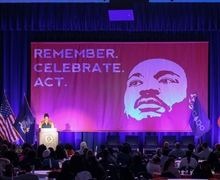CNY Fair Housing hosts 2nd annual Run the Redline race
Collin Snyder | Contributing Photographer
Those who choose to walk begin the Run the Redline race. Participants were able stop and view information about redlining along the route.
Get the latest Syracuse news delivered right to your inbox.
Subscribe to our newsletter here.
Over 100 runners participated in CNY Fair Housing’s second annual Run the Redline race Sunday morning to raise awareness about redlining practices that historically segregated the city.
During the race, participants followed a route that reflected red lines the city used when drawing neighborhood maps during the Great Depression. The lines, which traced predominantly Black neighborhoods, represented the areas that local leaders, real estate professionals and federal government officials deemed “too risky” to receive federal housing assistance, according to CFNY.
The course looked slightly different from last year due to construction on Interstate 81 removal efforts. The race’s opening stayed the same, though, with Deputy Mayor Sharon Owens giving a brief speech before the horn sounded.
“The Run the Redline race is an amazing opportunity for runners to actually run the actual redline,” Owens said. “I’m glad to see so many people out, see families out, see people really stepping up and understanding it’s not just a race. It’s a statement.”
The race displayed photos along the course of the targeted neighborhoods before and after the implementation of racially-dividing projects. The photos were also pasted on doors at an exhibit near the start of the race that were donated by Syracuse Habitat for Humanity.

Flynn Ledoux | Illustration Editor
Along with the denial of housing assistance, federal projects like the construction of the I-81 viaduct also created physical racial divisions in the city. The project included the demolition of Syracuse’s predominately-Black 15th Ward, which displaced around 1,300 families living in the area.
“Each door symbolizes a location along the red line, much of it going right along the 81,” Owens said. “Each of these doors represents where somebody lived, worshiped, played (and) came together as a community. And so here we are today, running that red line to really symbolize where we’re going in this community.”
With the introduction of new projects like the I-81 Viaduct Removal, the organization hopes the city has found a way to correct the existing racial divide, said Sally Santangelo, executive director of CNYFH.
CNYFH frequently features photos of redlined neighborhoods in its programs. Its latest event in July was the debut of a photo gallery of the 15th Ward and neighborhoods surrounding it. The gallery will be up until Oct. 31.
Among the race participants were several Syracuse University students. Isabelle Sareen, a senior majoring in advertising and marketing, said she signed up for the race to learn more about the city and its history.
“We’re talking about it (redlining) in a lot of my sociology classes that I take, and it’s really interesting to see Syracuse in the past versus Syracuse now,” Sareen said. “It’s a cool opportunity.”
The top finisher, 25-year-old Adam Beach, clocked in at a time of 15:48 — minutes ahead of last year’s top time of 18:05. As walkers were still crossing the finish line, Santangelo presented Beach and each age group’s award winners with medals.
Santangelo said she is unsure what the removal project means for the future of Run the Redline but said CNYFH will continue to host the event for as long as it can.
“This run was a way to physically show people how our community has changed because of discriminatory practices like redlining and urban renewal,” Santangelo said. “The goal is to spread awareness, teach people about what’s happened and give them a chance to actually physically experience a place with what the communities used to look like.”
Published on September 29, 2024 at 10:43 pm
Contact Henry: hdaley@syr.edu






